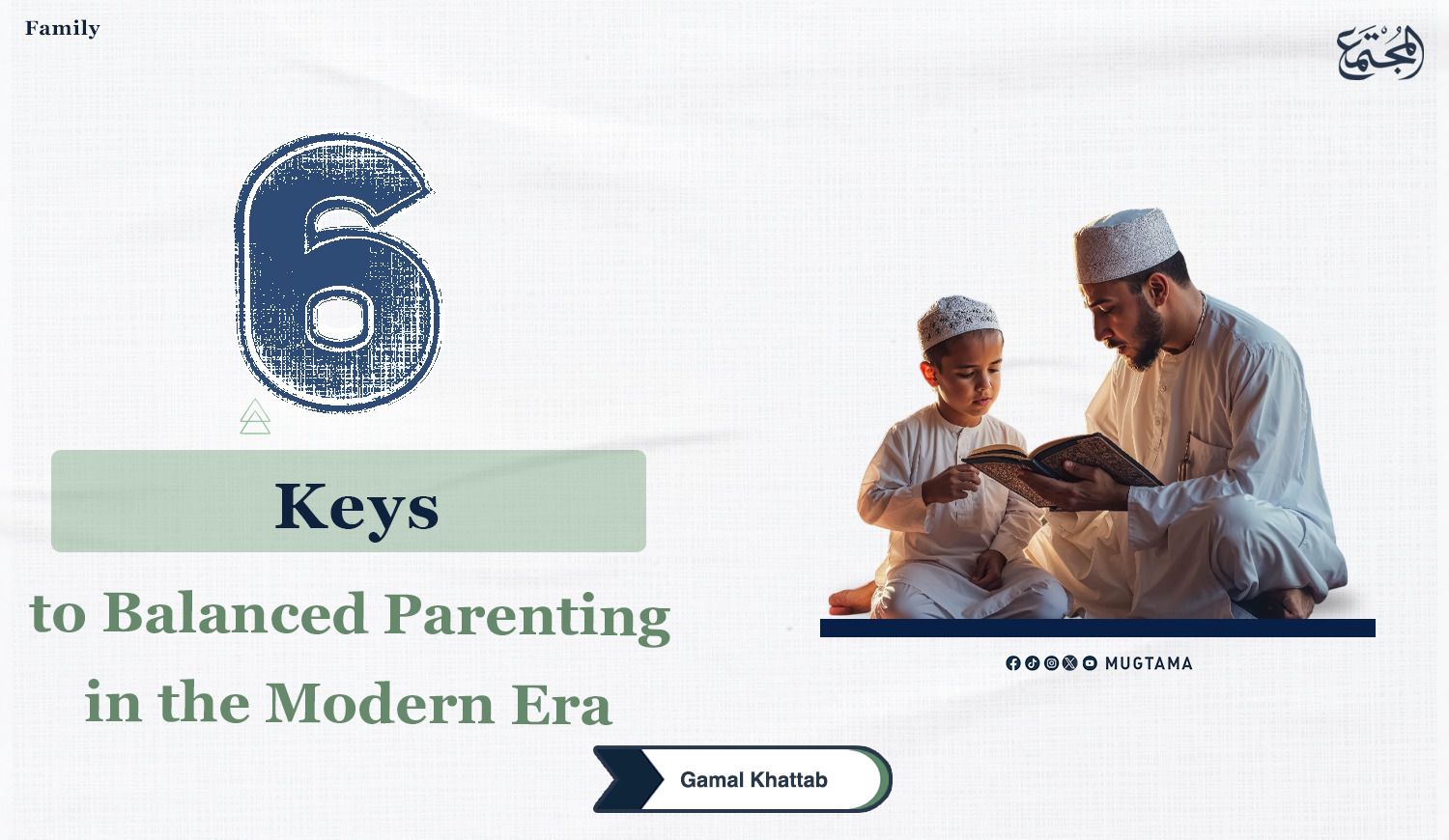The Eternal Reference for Muslim Parenting
6 Keys to Balanced Parenting in the Modern Era

There's no doubt that raising children should be a primary focus for both parents. This focus is even more crucial in today's digital age than ever before. Children and families face numerous, increasing, and complex challenges. So, how can we raise children to be both resilient and flexible? And how can we ensure they are socially and morally upright amidst life's pressures and modern challenges? The Holy Quran and the Prophet's Sunnah provide the solution to this difficult equation.
Here are 6 fundamental principles that must be observed to
achieve this challenging equation: balanced parenting that considers the
modern age without contradicting Islamic principles.
1. Emotional Containment
The Great Prophet, peace and blessings be upon him, said: "He is not of us who does not have mercy on our
young ones..." (Tirmidhi). Among its many meanings, mercy
(Rahma) includes emotional containment, which means understanding and
accommodating a child's emotional needs, and then interacting with them in a
way that fulfills their need for love and affection, while also teaching them
firmness in what is right.
There is no doubt that child abuse, especially emotional
abuse, is rejected and condemned in Islam. Islam encourages children to express
their opinions freely, which helps build their self-confidence. This is also
supported and advocated by educational experts.
2. Respecting Individual Differences
and Avoiding Comparisons
Allah Almighty says in the Holy Quran: "And We have raised some of them above others in
degrees..." (Al-Zukhruf: 32). This means that Allah created
human beings with inherent differences. Therefore, these differences must be
respected.
Neither the father nor the mother should compare their child
to their siblings or peers in a demeaning way, as this can cause psychological
pain and potentially create deep, unhealing psychological wounds.
Furthermore, parents should not impose extreme expectations
that children cannot meet, as this can make them feel helpless and weak if they
fail to achieve these goals. Instead, parents should celebrate their child's
talents and skills and not belittle their dreams and interests. This boosts
self-confidence and motivates them to work and produce.
3. Fostering a Sense of Security
Within the Family
A child should not feel fear, loneliness, or alienation within
the family. They must feel completely safe, as a secure family environment is
the strong foundation for a child's balanced development.
The Prophet, peace be upon him, said: "The best among you is the best to his family"
(Tirmidhi). Goodness is only achieved through expert and scientific work for
the sake of raising children with mercy and balance. Therefore, the Holy Quran
emphasizes the importance of love, mercy, and tranquility in family
relationships.
Shared acts of worship and spiritual practices are among the
pillars upon which security is built and which foster the love that nourishes
stability and continuity within the family.
4. Making Continuous Learning a Core
Goal
The Quran and Sunnah provide the fundamental principles for a
dignified life disciplined by Sharia. Therefore, education must provide the
ability to adapt to modern challenges such as social media and others.
Thus, families must teach children to have conscious responses
to these challenges. The Prophet, peace be upon him, said: "All of you are
shepherds, and all of you are responsible for your flock" (Bukhari).
5. Empowering Children to Express
Themselves Freely
Islam does not endorse tyranny; it has affirmed and practiced Shura
(consultation) since its state was founded. Allah Almighty commanded His
Prophet, peace be upon him, to consult with Muslims: "...and consult them in the matter..." (Al-Imran:
159). It is known that the Prophet, peace be upon him, used to engage in
dialogue with his companions and sometimes adopted their opinions. Dialogue and
discussion enhance mutual respect, critical thinking, and emotional
intelligence.
6. Avoiding the Imposition of
Parental Opinions
A common mistake in parenting is when parents try to make
their children achieve the dreams that the parents themselves failed to
achieve. This is a form of coercion that Islam rejects. Even religion itself
should not be imposed: "There shall be no compulsion in [acceptance of]
the religion." Therefore, parents must encourage their children's
independence within agreed-upon safe boundaries and guidelines.
Parents must differentiate between guiding their children and
controlling their choices. They should create a healthy environment where
children feel safe and can freely express their hopes, pains, and doubts, as
well as present their opinions and questions in a way they prefer, within the
framework of mutual respect.
Balanced parenting within the framework and limits of Islam
requires religious grounding from the Quran and Sunnah, as well as
intelligence, experience, and insight into the modern world and contemporary
parenting methods.
Islam, with its Quran and the Sunnah of its Prophet, peace be
upon him, remains the eternal reference for Muslim parenting. The Prophet's
life, with his kindness, wisdom, and forbearance, remains our role model and
the role model for our children, as long as the heavens and earth endure. Our
children will always be a trust upon us; we must emotionally contain them,
respect their differences and individuality, enhance their safety and security,
encourage their independence, and avoid suppressing them or restricting their
freedom.










